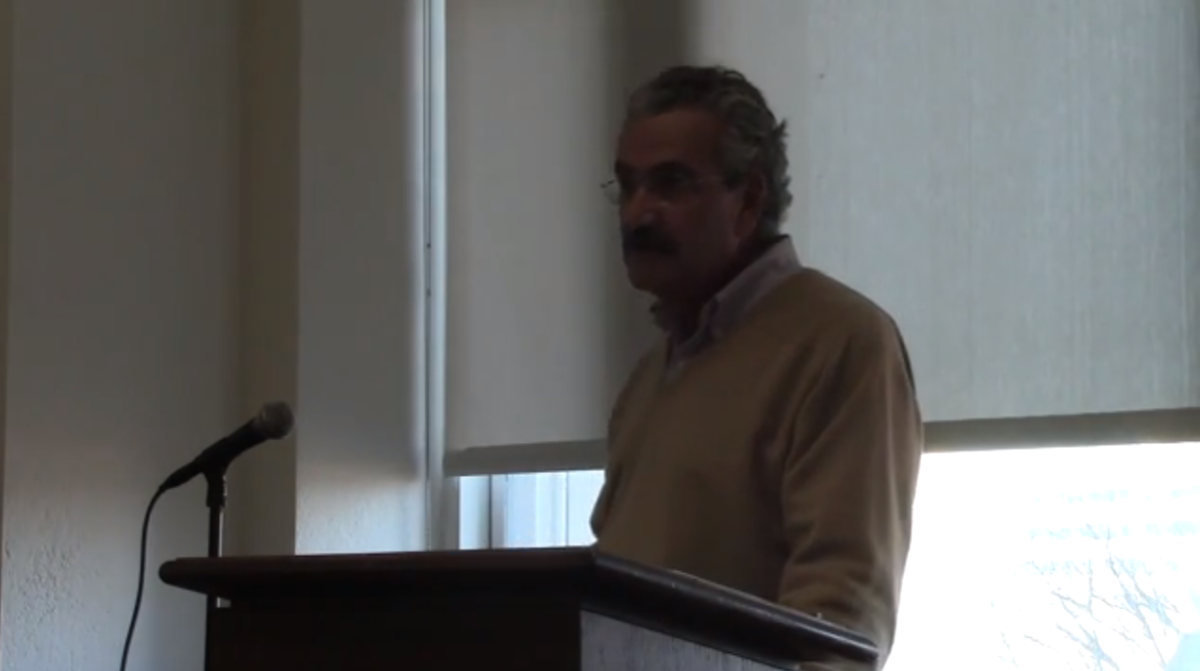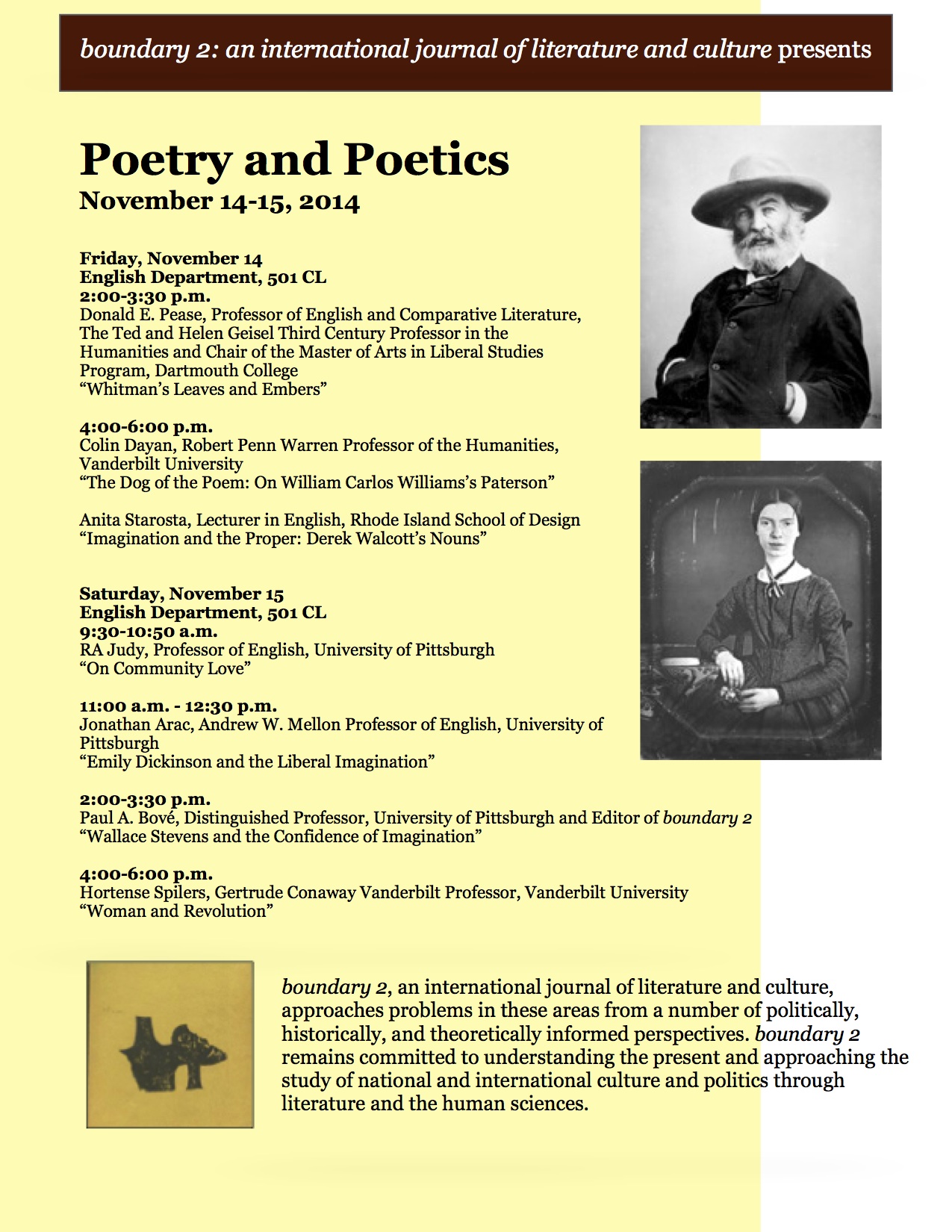boundary 2 is privileged to present a talk led by Paul A. Bove from the Poetry and Poetics conference held at the University of Pittsburgh on November 15, 2014.
Tag: Paul Bové
-
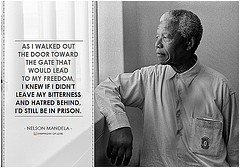
Mandela's Reflections: Meditations and Interventions from the b2 Collective
Editor’s Note
from Paul Bové
_Nelson Mandela died on December 5, 2013. Tony Bogues, a member of the boundary 2 Collective, was in South Africa, watching the endless coverage of the news and of Mandela’s life. Bogues had met Mandela during his time with the Jamaican government of Michael Manley, and he has spent considerable time working in South Africa, especially in Cape Town, on questions of freedom, archives, African and African Diaspora intellectual history, and political thought.
At least one generation of intellectuals had stood against apartheid and reflected on Mandela as a political figure of freedom and liberation. Mandela never produced anything equivalent to the political writings of a Gramsci, Fanon, or Césaire. Because of the media and the global support for the struggles he led, Mandela acquired a resonance with effects across the globe. His career, with all its changes, posed challenges for thinking about politics.
It seemed right that boundary 2 should take notice of Mandela and his influence. We decided to gather responses to Mandela as a political figure. b2 issued a call for very brief papers from several spots on the globe and from different generations. Our contributors have given us reason to feel this attempt was a success.
-
Mandela's Reflections
At least one generation of intellectuals had stood against apartheid and reflected on Mandela as a political figure of freedom and liberation. Mandela never produced anything equivalent to the political writings of a Gramsci, Fanon, or Césaire. Because of the media and the global support for the struggles he led, Mandela acquired a resonance with effects across the globe. His career, with all its changes, posed challenges for thinking about politics.
Editor’s Note from Paul Bové
Preface by Anthony Bogues
Mbu ya Ũrambu: Mbaara ya Cuito Cuanavale / The Cry of Hypocrisy: The Battle of Cuito Cuanavale by Ngũgĩ wa Thiong’o
Discomforts by Hortense Spillers
The Mandela Enigma by Wlad Godzich
Mandela, Charisma, and Compromise by Joe Cleary
Nelson Mandela on Nightline; or, How Palestine Matters by Colin Dayan
Or, The Whale by Jim Merod
Malaysian Mandela by Masturah Alatas
Mandela, Tunisia, and I by Mohamed-Salah Omri
Nelson Mandela by Ruth Y. Y. Hung
Mandela Memories: An African Prometheus by Ngũgĩ wa Thiong’o
Nelson Mandela: Decolonization, Apartheid, and the Politics of Moral Force by Anthony Bogues
Mandela’s Wholeness, Perhaps Infinite by Dawn Lundy Martin
[untitled] by Gayatri Chakravorty Spivak
Mandela’s Gift by Sobia Saleem
-
Mandela's Reflections: Editor's Note
Nelson Mandela died on December 5, 2013. Tony Bogues, a member of the boundary 2 Collective, was in South Africa, watching the endless coverage of the news and of Mandela’s life. Bogues had met Mandela during his time with the Jamaican government of Michael Manley, and he has spent considerable time working in South Africa, especially in Cape Town, on questions of freedom, archives, African and African Diaspora intellectual history, and political thought.
At least one generation of intellectuals had stood against apartheid and reflected on Mandela as a political figure of freedom and liberation. Mandela never produced anything equivalent to the political writings of a Gramsci, Fanon, or Césaire. Because of the media and the global support for the struggles he led, Mandela acquired a resonance with effects across the globe. His career, with all its changes, posed challenges for thinking about politics.
It seemed right that boundary 2 should take notice of Mandela and his influence. We decided to gather responses to Mandela as a political figure. b2 issued a call for very brief papers from several spots on the globe and from different generations. Our contributors have given us reason to feel this attempt was a success.
-Paul Bové
-
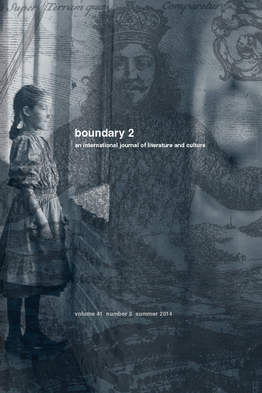
Summer 2014: Volume 41, Number 2
In Memoriam of Stuart McPhail Hall
Each crisis provides an opportunity to shift the direction of popular thinking instead of simply mirroring the right’s populist touch or pursuing short-term opportunism. The left…must adopt a more courageous, innovative, “educative” and path-breaking strategic approach if they are to gain ground.
–Stuart Hall and Alan O’Shea, “Common-sense Neoliberalism”
Summer 2014: Volume 41, Number 2
Intervention / Mandela’s Reflections
Editor’s Note from Paul Bové:
…We decided to gather responses to Mandela as a political figure. b2 issued a call for very brief papers from several spots on the globe and from different generations. Our contributors have given us reason to feel this attempt was a success.Preface by Anthony Bogues
Mbu ya Ũrambu: Mbaara ya Cuito Cuanavale / The Cry of Hypocrisy: The Battle of Cuito Cuanavale by Ngũgĩ wa Thiong’o
Discomforts by Hortense Spillers
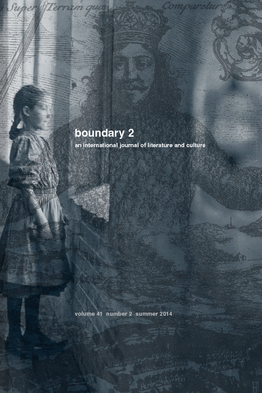
The Mandela Enigma by Wlad GodzichMandela, Charisma, and Compromise by Joe Cleary
Nelson Mandela on Nightline; or, How Palestine Matters by Colin Dayan
Or, The Whale by Jim Merod
Malaysian Mandela by Masturah Alatas
Mandela, Tunisia, and I by Mohamed-Salah Omri
Nelson Mandela by Ruth Y. Y. Hung
Mandela Memories: An African Prometheus by Ngũgĩ wa Thiong’o
Nelson Mandela: Decolonization, Apartheid, and the Politics of Moral Force by Anthony Bogues
Mandela’s Wholeness, Perhaps Infinite by Dawn Lundy Martin
[untitled] by Gayatri Chakravorty Spivak
Mandela’s Gift by Sobia Saleem
_____Three Models of Emergency Politics by Bonnie Honig
Democracy: An Unfinished Project by Susan Buck-Morss
The Future of Reading? Memories and Thoughts toward a Genealogical Approach by Hans Ulrich Gumbrecht
_____
b2 Interview
History Unabridged: An Interview with Stefan Collini with Jeffrey J. Williams_____
Articles
King Kong in America by Arif DirlikHow Global Capitalism Transforms Deng Xiaoping by Ruth Y. Y. Hung
Is Dasein People? Heidegger According to Haugeland by Taylor Carman
It’s Only the End of the World by Ben Conisbee Baer
Passive Aggressive: Scalia and Garner on Interpretation by Andrew Koppelman
-

A Closing Discussion to 'Legacies of the Future'
Only to put a pin in b2‘s Legacies of the Future: The Life and Work of Edward Said, and the question: what is criticism? And: what is ‘its relationship, among other things, to specifically–but not exclusively–literary form and the function of imagination?’ Here, the scope found in Said.
Trace the entirety of the conference here. (The volume is better with earphones.)
